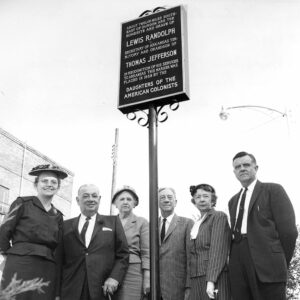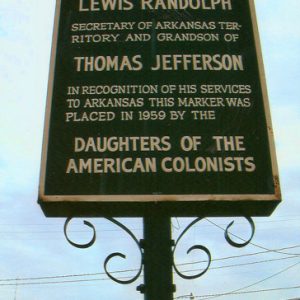calsfoundation@cals.org
Meriwether Lewis Randolph (1810–1837)
Meriwether Lewis Randolph, a grandson of Thomas Jefferson and friend of Andrew Jackson, served as the last secretary of the Arkansas Territory. Despite his strong connections with many influential families in Virginia, as well as intimate friendships with numerous U.S. presidents, he chose to settle on the Arkansas frontier. He obtained thousands of acres of land in Clark County with the intent of establishing a plantation and making his residence there. His education, family, and social ties offered great promise to the new state, but his contributions were cut short by an early death.
Some sources have Randolph’s birth date as January 10, 1810. His father, Thomas Mann Randolph, was a member of a prominent Virginia family and served as governor of Virginia from 1819 to 1822. His mother, Martha Jefferson, was a daughter of the former president; the Randolphs were living with Jefferson at Monticello at the time of Meriwether’s birth. He was named for Meriwether Lewis, who had served as Jefferson’s private secretary and as commander of the Lewis and Clark Expedition. Randolph had eleven siblings.
Randolph was provided a classical education and studied law at the University of Virginia. When he went to Washington DC in 1829 while still a student, his Jefferson connections brought him to the attention of President Andrew Jackson. He was one of the floor managers for Jackson’s 1833 inaugural ball, and Jackson became his mentor and sponsor.
On February 23, 1835, Jackson appointed Randolph as secretary of the Arkansas Territory to replace William S. Fulton, who became governor. Randolph arrived in Little Rock (Pulaski County) as a young man of twenty-five to begin his appointment.
On April 9, 1835, Randolph married Elizabeth (Betty) Martin, Jackson’s grand-niece.
The Times, a Little Rock newspaper that customarily opposed all things proposed by the Democratic Party, spoke approvingly of him. As additional counties were created in 1836, it was proposed that Randolph County be named for him. Randolph, however, stated that he had resided in Arkansas for only a short time and had done nothing to merit such recognition, but, if it was desired that the Randolph name be attached to the county, it should be named for John Randolph of Roanoke, Virginia, which it was.
Land speculation had become the most lucrative business in the territory. Those with adequate financing could purchase government land and soon double their money by reselling it. As Randolph’s term as secretary was coming to an end in 1836 due to statehood, Jackson provided him with letters of introduction to various Eastern capitalists interested in land speculation. As an agent for them, he purchased thousands of acres in present-day Clark, Ouachita, Dallas, Nevada, and Conway counties.
Randolph used his fees from these transactions to purchase land for himself in southeastern Clark County between the Little Missouri River and Terre Noir Creek. He purchased over 6,000 acres of land in 1836, and in 1837, he purchased another 4,229 acres. Randolph’s plan was to build a “great house,” patterned after Monticello, on his plantation. By the summer of 1837, he had cleared and cultivated 300 acres and built a “dog-trot” house where he, Betty, and their young son and only child, Lewis Jackson Randolph, lived. Cotton was their primary crop.
In September, Randolph left by cypress dugout for Ecore Fabre, present-day Camden (Ouachita County), to purchase supplies for the winter. He fell ill after enduring rain during most of the two-week trip and died of malaria on September 24, 1837, at the age of twenty-seven. His wife and son returned to Tennessee. Randolph died without a will, and his holdings were liquidated.
In 1960, the Daughters of the American Colonists dedicated a stone monument with an iron fence at the site of Randolph’s home and grave. They lie on private land and away from public roads southeast of Gurdon (Clark County).
For additional information:
Nelson, Grace B. “Lewis Randolph.” Three-part series. Arkansas Gazette. January 29, 1956, p. 2F; February 5, 1956, p. 2F; February 12, 1956, p. 2F.
Smith, Eula Burns. “Teacher Turned Detective to Find Grave.” Arkansas Gazette, Magazine Section. October 3, 1971, p. 5.
Robert B. Nelson
Little Rock, Arkansas
 Louisiana Purchase through Early Statehood, 1803 through 1860
Louisiana Purchase through Early Statehood, 1803 through 1860 Randolph Plaque
Randolph Plaque  Meriwether Lewis Randolph Memorial Marker
Meriwether Lewis Randolph Memorial Marker 




Comments
No comments on this entry yet.